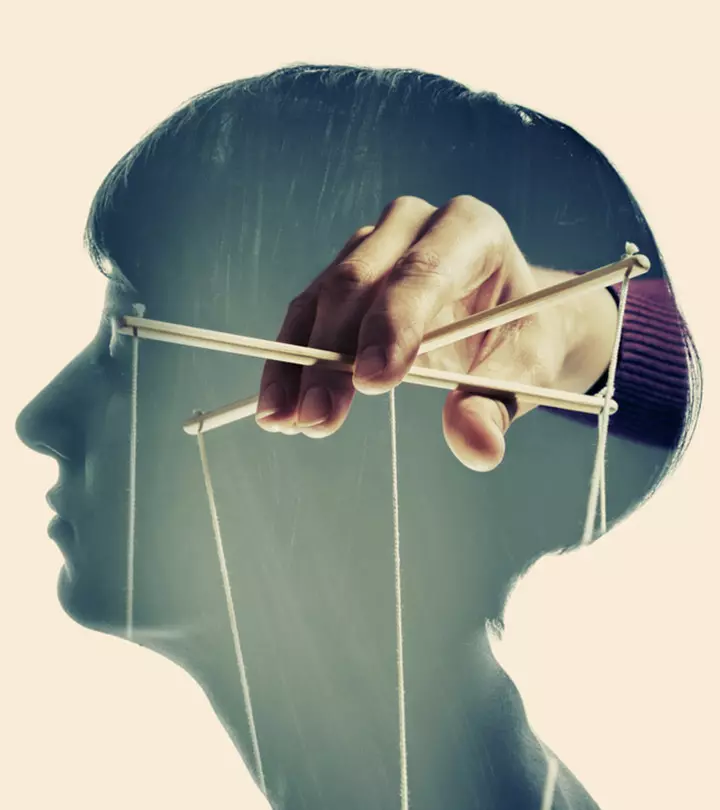10 Signs Of An Emotionally Immature Person And Ways To Deal
If they act impulsively and refuse to compromise, it is time to reevaluate your relationship.

Image: Shutterstock
Dealing with an emotionally immature person can be quite frustrating, especially when closely associated with them. Such people are ignorant, lack empathy, exhibit impulsive behavior, and are short-tempered, among other things.
Identifying the condition is the first step towards tackling someone emotionally immature. Then, you have to approach this person with patience and perseverance. Remember, the traits mentioned above can make interactions with emotionally immature people difficult and lead to awkward public situations. In this article, we have listed 10 signs that point towards an emotionally immature adult and how you can deal with them. Continue reading to know more.
In This Article
What Is Emotional Immaturity?
According to the Australian Institute of Family Counselling (AIFC), “Those who are emotionally immature are unable to handle their unpleasant emotions, act and react to those feelings, and can’t make sense of situations or defend themselves in an appropriate way.” (1)
The American Psychological Association defines emotional immaturity as “a tendency to express emotions without restraint or disproportionately to the situation.” (2)
The AIFC further elaborates why some people are emotionally immature, which can provide clues to identify immature behavior. Like most psychological disorders, the cause of emotional immaturity is rooted in the person’s childhood. Discouragement to express sadness or anger, lack of guidance to deal with conflicts, stresses of growing up, and inability to seek help and support are a few reasons for ignorance, defensiveness, and impulsivity (1).
People who struggle with emotional immaturity often find it difficult to manage their feelings. This often leads to impulsive behavior and difficulty in handling stress. It can create friction in personal and professional relationships. Over time, the inability to regulate emotions can result in feeling isolated. Emotionally immature people may also develop a negative self-image as they become aware of their challenges in maintaining stable relationships or achieving personal goals.

Emotional immaturity is a complex behavioral and psychological issue faced by many. However, knowing the telltale signs can be an advantage while dealing with an emotionally immature person.
Emotional immaturity can affect a person’s relationships in the long run. Find out how in the next section.
Key Takeaways
- Emotionally immature people are ignorant, lack empathy, exhibit impulsive behavior, and are short-tempered.
- There are signs indicating a person is emotionally immature, like avoiding tough situations or craving too much attention.
- While you may deeply care about this person, you may feel the need to set some boundaries. There are different ways you can deal with an emotionally immature person, such as being vocal about your feelings and more.
How Does Emotional Immaturity Affect Relationships?

Emotional maturity is undoubtedly one of the pillars of a healthy relationship, be it romantic or otherwise. The ability to process and handle emotions and take responsibility for them under any circumstance can largely determine a relationshop’s quality.
A blogger mentions a situation that highlights the consequences of an emotionally immature person in family dynamics, particularly when unresolved trauma and unaddressed actions from the past fuel resentment and conflict. She recalls an incident and writes, “She could have genuinely apologized for the past, and responded in a more loving way, much earlier on. I am not saying that that would have been enough to heal everything – the whole family were blistering with resentment and rage toward one another – but it could have been better. Her unwillingness to accept responsibility for her actions, to try and create a better future for all concerned, was not coming from an emotionally mature place (i).”
An emotionally immature person may not be ready to have a proper conversation in times of conflict, leading to communication issues, exhaustion, frustration, and loneliness in the relationship. The lack of expression and inability to trust and reassure their partner may slowly deteriorate the relationship over time. The long-term effects of emotional immaturity in relationships can lead to ongoing conflicts due to their inability to communicate effectively. Over time, this will cause emotional distance and a lack of trust between partners. In severe cases, persistent immaturity can cause relationships to break down.
To understand an emotionally immature individual better, this article draws from a blend of academic research, psychological literature, real-life stories, anecdotal evidence, and insights from online forums and discussions. The solid base comes from peer-reviewed journals and studies, but personal accounts and observed interactions give insight into how emotional immaturity plays out in everyday life. If you want to know whether you are dealing with an emotionally immature person, check out the next section for signs to look out for. Instructively, the article also gives insights and actionable strategies to establish a more reliable, accessible way for readers to understand and navigate situations with an emotionally immature person. Read on.
10 Signs Of An Emotionally Immature Person
- They Avoid Tough Situations – An emotionally immature person tends to avoid a challenging situation. They are not emotionally capable of thinking critically, laying out their points, or possessing the open-mindedness to listen to what others have to say. They either do not acknowledge the situation or remove themselves from the discussion. The issues remain unresolved and lead to a rift in the relationship.
- They Do Not Empathize – Their emotional detachment stops them from empathizing with others’ emotions and feelings, making them seem self-centered. It is about fulfilling their needs, and they seldom apologize for hurting people with their actions or words.
A blogger shared that she behaved in an emotionally immature way because of her drug addiction. She neglected the needs of her daughter and abused her because she was interfering with her activities, “I’ve been angry toward her because I wanted to watch a movie and drink and she was trying to get my attention (ii).”
- They Demand Attention – It is humane to seek attention from people that matter the most. However, when it comes to emotionally immature people, they demand attention from everyone. When their demands are not attended to, they act negatively.
- They Are Narcissists – According to the American Psychological Association, narcissistic personality disorder “causes people to have a delusional sense of self-worth and lack of empathy.” (3)

An emotionally immature person thinks that they are the most important person, which prevents them from understanding that both parties have equal importance in a relationship.
- They Bully And Spread Rumors – What will an immature person do if they do not get what they want? Exactly opposite of respecting someone’s decision and taking a step back. They resort to bullying and acting childish if things are not their way – make snide comments and spread rumors to avenge their hurt ego. This toxic behavior can ruin a beautiful friendship or relationship.
- They Get Defensive – An emotionally immature person not only does not own up to their mistakes but also becomes highly defensive when confronted. They make up unreasonable arguments for their actions and even blame the person who is confronting them. They are often incapable of articulating their feelings, which makes them defensive. They are also incapable of taking any kind of feedback or criticism.
- They Act On Impulse – Impulsive and reckless behavior such as outbursts of anger, uttering hurtful things, or leaving abruptly whenever the situation gets uncomfortable is a classic trait of emotional immaturity. They do not know how to talk logically without getting emotional.
A study reaffirms that individuals with emotional instability tend to experience erratic mood swings. Emotionally immature people cannot help but overreact to minor dilemmas. This implies frequent clashes or exaggerated reactions that may show up in interpersonal relationships (4).

- They Have Commitment Phobia – Be it a romantic relationship or career, an emotionally immature person has difficulty committing to anything. They are always in doubt and fear of the unknown. They often disguise this under the pretense of living a happy life to avoid making an effort to build a strong relationship or future.
- They Do Not Talk About Their Feelings – Having deep conversations about their emotions makes an emotionally immature person uncomfortable. Expressing feelings and emotions is a sign of weakness for them. This prevents them from getting the help they need. It also makes them turn life stressful for people who deal with them regularly.
- They Do Not Like Compromising – Compromise is also a sign of weakness for an emotionally immature person. It has to be their way or the highway. They do not understand that relationships are a two-way street, and to make relationships work, people need to compromise more than once.
If you identify more than one trait that your husband, wife, parent, or colleague exhibits, you know what’s the source of your frustration and dissatisfaction
. But there are ways to deal with an emotionally immature person. Scroll down to find out.
How To Deal With An Emotionally Immature Person
- Draw Healthy Boundaries

Dealing with an emotionally immature person can eventually become toxic, whether your parent, spouse, friend or colleague. Therefore, it is best to draw healthy boundaries. Stop making excuses for them – defending them or giving in to a heated argument. Give them their due attention and politely take your leave while working, watching a show, or just enjoying your “me time”.
 Quick Tip
Quick Tip- Show Your Support
The last thing you want to do while dealing with an emotionally immature person is withdrawing your support. It will only aggravate their emotional behavior. Listen to them when they act impulsively and lay out possible solutions. Show them your support by appreciating their true talents and lend a helping hand even if they don’t ask for it.
- Have A Heart-To-Heart Conversation

If you are in a relationship with an emotionally immature boyfriend or girlfriend, it is important to sit down with them and have a heart-to-heart conversation. Tell them that you do not hold any grudges and are there to make peace. But you are also disturbed by their behavior, and it costs your happiness. Two things may happen — it may help you gradually build emotional intimacy if the conversations are fruitful, or, your partner may not care at all. Either way, you will understand what their intentions are and how to move forward.
- Don’t Take Things Personally
Understand that their reactions, defensiveness, or lack of accountability are reflections of their struggles, not your worth. Detach yourself emotionally when they lash out or act irrationally, and recall that their acting out has absolutely nothing to do with you.
- Speak Clearly And Calmly
Speak clearly with no provocative talk that might inflame their reaction. Use “I” statements rather than an accusatory voice (for instance, “I feel hurt by this” and not “You never listen”). Steer the talk towards solutions, not into an arena of finger-pointing and past resentments.
- Never Engage In Power Struggle
Don’t engage in arguments or try to “win” against someone emotionally immature; they may escalate conflicts instead of resolving them. Focus on de-escalating tension by staying calm and steering the discussion back to constructive ground.
- Show Emotional Maturity
Lead by example. Show how emotionally mature people handle challenges, communicate, and take responsibility. For example, admit your mistakes, validate others’ feelings, and respond with empathy, even if they don’t.
- Encourage Self-Reflection
Ask gentle, open-ended questions to help them reflect on their behavior without directly criticizing them. Avoid being preachy or patronizing, as it may trigger defensiveness. Acknowledge small signs of progress, even if they’re incremental.
- Choose Your Battles
You don’t need to confront everything he does. Learn the difference between an irritation and an issue to be confronted. Think of saving your energy for when it counts the most.
- Take Professional Help
If you feel you cannot get through to your emotionally immature partner, then you should seek help from a professional therapist or counselor.
 Quick Tip
Quick TipInfographic: Ways To Improve Emotional Intelligence
Emotional immaturity is characterized by irresponsible, selfish, petulant, naive, thoughtless, irrational, short-sighted, puerile, infantile, unwise and imprudent behaviors and actions. Individuals who are emotionally immature can be bratty, juvenile, impetuous and unthinking and lack the ability to handle their emotions and tend to react impulsively, without considering the consequences of their actions. They often make the environment toxic. However, there are ways to improve your emotional intelligence if you are willing to put in the effort. This will improve not only your relationships with others but also your mental health.
Check out the infographic below for some tips to regulate your emotions and improve your emotional intelligence.
Some thing wrong with infographic shortcode. please verify shortcode syntax
Growing up in an emotionally immature environment may result in infantilismi A developmental disorder in which adults exhibit childish behavior like conversing in infantile speech. in adults. People with infantilism may exhibit socially inappropriate behavior that could hurt them and others. Their trauma becomes their identity, and most of the time, there is no point in arguing with them. The only way forward is to recognize the signs of trauma and arrive at mutually respectful grounds. You could do your best to understand and help them, but there may be a need for medical intervention in certain cases. Finally, it is not your responsibility to fix anybody, do only as much as your mental bandwidth allows. It might be better to keep your distance until you notice some improvement in them.
Frequently Asked Questions
How can emotional intelligence help in dealing with emotionally immature individuals?
Emotional intelligence enables you to manage your own emotions and respond calmly and constructively in challenging situations.
Is emotional immaturity a mental illness?
No. The Diagnostic and Statistical Manual of Mental Disorders doesn’t list emotional immaturity as a mental disorder. However, in some extreme cases, its characteristics may align with some symptoms of narcissistic, anti-social, borderline, and histrionic personality disorders.
How do emotionally immature men love?
An emotionally immature man may deflect deep conversations and blame. As a result, they cannot form an intimate, emotional connection as they are not in touch with their emotions.
Can therapy help someone overcome emotional immaturity?
Yes, therapy can help identify the underlying reasons for the issue, their behavioral patterns, and help the person cope with and manage their emotions.
How can I communicate with someone who is emotionally immature?
It can be challenging to communicate with an emotionally immature person. They may not be able to respond positively or control their emotions during a conversation. You have to be calm, composed, and well aware of the possible response from them. Try to understand their feelings and be patient and compassionate.
Are there any negative consequences of dealing with an emotionally immature person?
Yes, there can be negative consequences for the emotionally immature person and the others around. They can be immensely unpredictable and cause stress to the people around them. Being in a relationship with such people can cause strained relationships and have a negative impact on the mental health of the partner.
Can emotional immaturity be a result of past experiences or trauma?
Yes, trauma in the past could be caused by altered emotional development. Traumatic episodes, neglect, or physical or emotional abuse can manifest as difficulty in emotional regulation and fear of attachment in adulthood. They may also respond aberrantly to stressors or triggers.
Can emotional immaturity be a cause of mental health issues, such as depression or anxiety?
Yes, adverse mental situations can contribute to emotional immaturity, but they are not the sole reasons for the condition. Depression or anxiety can trigger an unregulated flow of emotions which can lead to isolation or unhealthy behavior.
Are you unable to handle your emotions most of the time? Click on the video and learn 8 things emotionally immature people do and how you can avoid them.
Personal Experience: Source
StyleCraze's articles are interwoven with authentic personal narratives that provide depth and resonance to our content. Below are the sources of the personal accounts referenced in this article.
(i) Emotional immaturity: habitually reacting to life, rather than responding – it will prevent you from ever moving forward!https://leannehalyburton.com/2019/09/21/why-emotional-immaturity-is-a-destructive-force-that-will-screw-your-life-up/
(ii) I’ve done things while acting out on my addiction that I would never do when focusing on recovery. What were they?
https://mystepworkna.blogspot.com/2012/11/ive-done-things-while-acting-out-on-my.html
References
Articles on StyleCraze are backed by verified information from peer-reviewed and academic research papers, reputed organizations, research institutions, and medical associations to ensure accuracy and relevance. Read our editorial policy to learn more.
- Emotional Immaturity Linked to Depression and Anxiety
https://www.aifc.com.au/emotional-immaturity-linked-to-depression-and-anxiety/ - Emotional immaturity
https://dictionary.apa.org/emotional-immaturity - Speaking of Psychology: Recognizing a narcissist
https://www.apa.org/news/podcasts/speaking-of-psychology/narcissism - A Comparison of the Spouse Selection Criteria and Emotional Maturity between Men and Women
https://www.researchgate.net/publication/277651486_A_Comparison_of_the_Spouse_Selection_Criteria_and_Emotional_Maturity_between_Men_and_Women
Read full bio of Dr Nancy B Irwin
Read full bio of Sneha Tete
Read full bio of Shatabdi Bhattacharya
Read full bio of Sangita Goel




























Community Experiences
Join the conversation and become a part of our empowering community! Share your stories, experiences, and insights to connect with other beauty, lifestyle, and health enthusiasts.